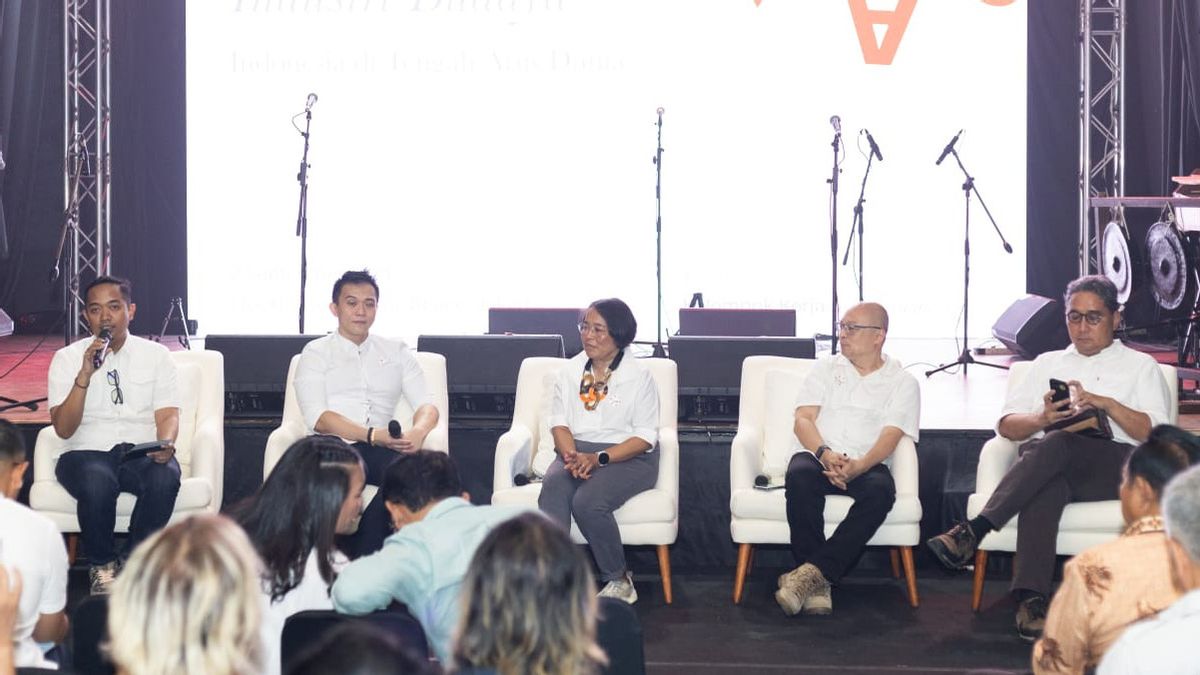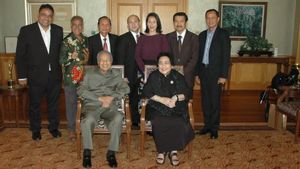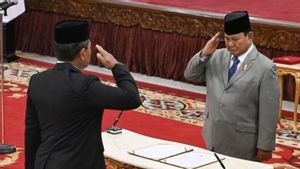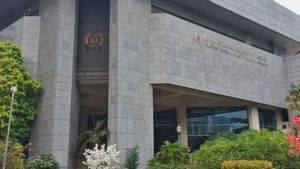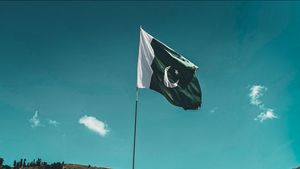JAKARTA - More than 200 prominent figures from the cultural sector and the creative economy gathered in a public discussion organized by the Culture Working Group. This discussion was held to highlight the urgency of the establishment of the Ministry of Culture as an effort to strengthen and direct the management of the cultural sector and the creative economy in Indonesia.
The event was attended by various stakeholders, including artists, culturalists, academics, and creative industry players, who jointly discussed strategic steps to realize the Ministry of Culture. This ministry is expected to function as a body specifically for managing the development of the cultural sector and the creative economy which is increasingly vital in shaping cultural identity and supporting the national economy.
Hilmar Farid, Director General of Culture of the Ministry of Education, Culture, Research, and Technology of the Republic of Indonesia, was one of the main speakers in this discussion. In his presentation, Hilmar emphasized the importance of establishing the Ministry of Culture as an effort to manage Indonesia's cultural wealth more structured and effective.
"Indonesia is a country with extraordinary biodiversity and cultural richness. The combination of both is extraordinary potential and assets that need to be protected, developed, and utilized in order to contribute significantly to national development. Our urgent task is to build an ecosystem that can optimally manage these important assets, involve the government, the business world, and the community. Of course this is not an easy task. We need an agile organization and mechanism to lead this process given the scale and scope of affairs, complexity, and resources that are not small. I think the idea of the ministry of culture is right, just formulate the details of its duties and functions so that big goals can be achieved, "said Hilmar.
This public discussion not only discusses the domestic aspects of the formation of the Ministry of Culture, but also highlights the relevance of Indonesia's cultural policies in the global context. The discussion participants agreed that the increasing world attention to the creative economy and Indonesian culture sector made the formation of the Ministry of Culture even more urgent.
Okky Tirto, a representative of the People's Cultural Alliance and a member of the Cultural Working Group, stated that in this globalization era, culture has become an important instrument in international diplomacy and national identity formation.
"We see that a ministry specifically dealing with culture will play an important role in formulating policies that support innovation, promoting the diversity of Indonesian culture in the international arena, and protecting our cultural wealth from external pressure," said Okky.
Okky also added that the establishment of the Ministry of Culture is a crucial step to ensure that the development of the cultural sector and the creative economy in Indonesia is carried out in a direction and structured manner.
"With this ministry, we can focus more on supporting the growth of this sector, both in terms of policy, funding, and infrastructure," he explained.
"As a soft power, culture should be used to become a diplomatic instrument and national defense. So it is time for culture to be addressed as a strategic issue, not a second-class issue under the economy and politics. With a heavy duty burden related to culture, it is necessary more than just a body or directorate general. We need a ministry of culture with authorities that may work. Without sufficient work instruments, the cultural strategy will not be optimal for operation," he further said.
This discussion is also a forum to highlight various important issues currently faced by the cultural sector and the creative economy in Indonesia. Several topics discussed include:
Reviewing the Improvement of Inter-Institutional Coordination: One of the main issues discussed is the need for better coordination between various government institutions and the private sector in the development of culture and the creative economy. Discussion participants emphasized that strong coordination will enable more effective and efficient implementation of policies.
Bigger Financial Support: Another issue that is also of concern is the need for greater financial support for cultural sector players and the creative economy. In this case, participants suggested that the government provide more incentives and access to funding for artists, creators, and local creative industry players.
Strengthening Infrastructure and Technology Access: This discussion also highlights the importance of strengthening infrastructure and access to technology for local artists and creators. Participants agree that access to technology is the key in supporting innovation and increasing the competitiveness of Indonesia's cultural sector and creative economy at the global level.
Education and Training: In addition, education and training are also important topics in this discussion. The participants emphasized that the development of new talents in the field of culture and the creative economy must be a priority, so that Indonesia can continue to produce creative works that are able to compete in the international arena.
Ivan Chen, Founder of Anantarupa, was also present as a speaker in this discussion. In his presentation, Ivan emphasized that the challenges faced by the cultural sector and the creative economy in Indonesia are systemic, thus requiring a comprehensive solution. He explained that the cultural framework that has been formulated in Law no. 5 of 2017 concerning the Advancement of Culture, needs to be implemented more integrated to create what is referred to as a cultural loop.'
The target of cultural strategies is to create cultural sovereignty that can be measured through the preservation of traditional culture, internalization of cultural values to new media, strengthening cultural diplomacy, cultural resilience to foreign influences and growth of new economic forces. All of these targets can be achieved if we are able to carry out 'cultural loops' properly, namely through the process of protection, development, utilization, and cultural development, "explained Ivan.
SEE ALSO:
In line with what Ivan Chen, Svida Alisjahbana as Chair of the APINDO Creative Economy and Chairman of Jakarta Fashion Week who is also a speaker, added, to advance Indonesia's creative industry, we cannot just preserve tradition.
"We must make it relevant to the times. The government's active role is needed in standardizing, supporting, and incubating local talents in order to be able to compete on the global stage," said Svida.
This public discussion is expected to be a significant first step in efforts to establish the Ministry of Culture. With this ministry, it is hoped that Indonesian culture can be more protected, developed, and make a greater contribution to national development and national identity.
Closing the discussion, Manneke Budiman, academics and representatives from the Indonesian Cultural Circle, expressed their views on the importance of adaptation and transformation in culture.
"Government is a dynamical process that always develops and adapts to the times. Therefore, culture must have the resilience as well as flexibility to move forward. Transformation is the key to maintaining cultural sustainability, so that it can continue to be a source of strength for the nation's character and the main driver in creating new economic forces," concluded Manneke.
The Culture Working Group is committed to continuing to oversee this process and hopes that this discussion will be an important milestone in the journey of the formation of the Ministry of Culture which all stakeholders dream of in the cultural and creative economy sectors of Indonesia.
The English, Chinese, Japanese, Arabic, and French versions are automatically generated by the AI. So there may still be inaccuracies in translating, please always see Indonesian as our main language. (system supported by DigitalSiber.id)
